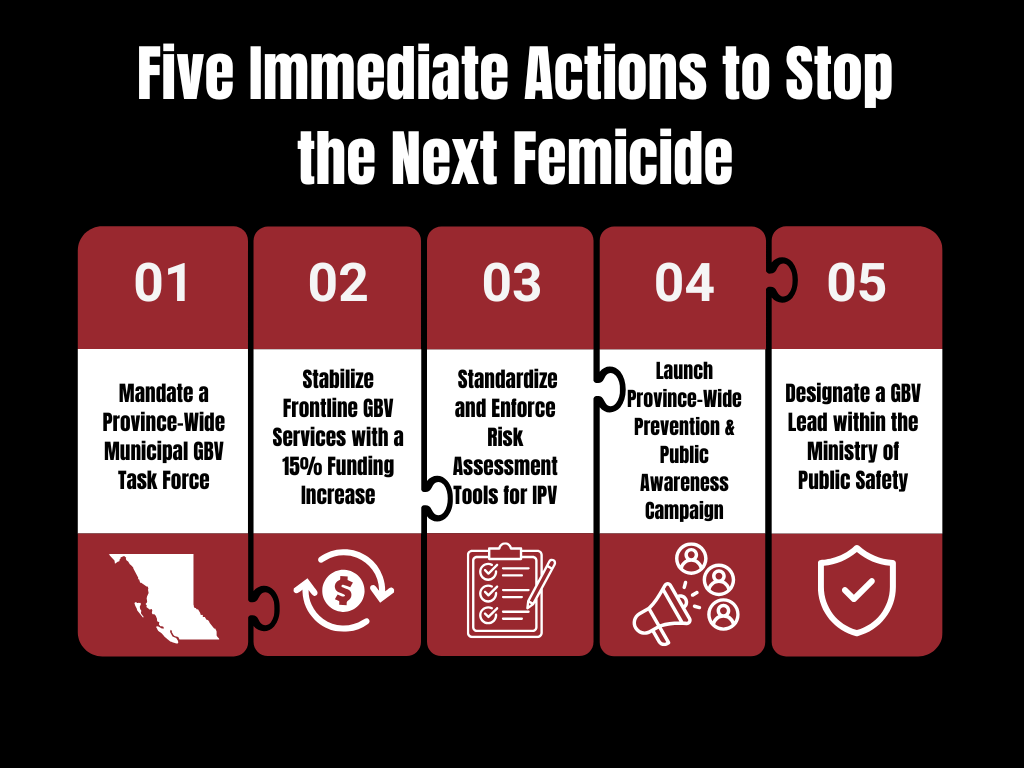
A public safety failure. A systemic pattern. A chance to act. Gender-based Violence is endemic
Since just the end of May, we’ve seen multiple femicides in communities across B.C.—a cascade of loss rooted in gaps at every level of the system. Even when survivors reached out, the responses were fragmented: RCMP failed to respond, risk assessments were missed, legal protections went unenforced, and frontline services remained undervalued.
These aren’t isolated incidents. They’re not crises of compassion. They are the predictable outcomes of systems that were never built with survivors in mind.
This is what a public safety failure looks like.
For too long, public safety has been narrowly defined by law enforcement. But policing alone cannot prevent femicide. True public safety means coordinated action across all levels of government. It means legal systems that protect, social systems that respond, housing systems that shelter, economic systems the support survivors, and health systems that heal. It means trauma- and violence-informed services that meet survivors before crisis hits.
Public safety doesn’t end with the police—it starts with all of us.
We cannot wait for the next tragedy. That’s why BWSS is putting forward Five Immediate Provincial Actions to Stop the Next Femicide—designed to embed survivor-informed safety across public systems.
Five Immediate Provincial Actions
1. Mandate a Province-Wide Municipal GBV Task Force
Establish a cabinet directive requiring every municipality to convene a gender-based violence (GBV) task force. Terms of reference should ensure victim/survivor-centred practice, community-based leadership, and coordination across public safety, housing, and justice systems—starting with intimate partner violence (IPV) as a core priority.
2. Stabilize Frontline GBV Services with a 15% Funding Increase
Provide $14.1M in crisis stabilization funding to address wage disparities and growing demand across PEACE, STV Outreach, and Community-based Victim Services Programs. Priority should be given to services responding to IPV, where staffing shortages are putting lives at risk. This funding can complement ongoing collective bargaining processes and serve as a workforce retention measure.
3. Standardize and Enforce Risk Assessment Tools for Intimate Partner Violence
Mandate consistent use of approved IPV risk assessment tools (e.g., SIPVR) across police, Crown, and MCFD. Introduce enforcement, oversight, and training mechanisms to ensure these tools are not optional but standard public safety protocol.
4. Launch a Province-Wide Prevention and Public Awareness Campaign
Phase in education and prevention programming, beginning with a cross-ministry public awareness campaign on intimate partner violence. Build on existing provincial communications infrastructure (e.g., wildfire, overdose, vaccine messaging). Future phases should include GBV prevention in schools, workplaces, and community settings.
5. Designate a GBV Lead within the Ministry of Public Safety
Appoint an interim or permanent cross-ministerial lead on GBV—ideally with IPV experience—to coordinate implementation, liaise with municipalities, and ensure alignment across justice, housing, and health etc. This role can be assigned via internal realignment, without triggering new hiring or budget allocations.
Our proposal is not aspirational, it’s urgent and actionable. When public safety means more than sirens—and is built with survivors in mind—lives change. A survivor-centred infrastructure saves lives before tragedy strikes, offers healing on the other side of abuse, and dismantles the belief that violence is inevitable.
This is our moment to act. We must transform the system, starting now, and do so with unwavering survivor leadership. If this feels like the public safety you’ve been waiting for, stand with us, please ask your municipality to form a GBV task force, demand risk assessment enforcement, support frontline services, and insist that GBV be treated as the public safety emergency it is. Together, we can stop the next femicide not after it’s written in headlines, but before the violence ever begins.



